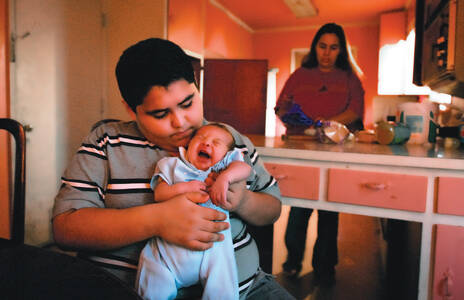The U.S. Immigration and Customs Enforcement agency reports that its Secure Communities program has resulted in the deportation of thousands of migrants because of serious criminal offenses. But critics of the program, including local government and police officials and immigrant advocates, say the reality on the street is that the effort has instead thrown a wide net over the undocumented community with little selectivity. The Secure Communities program uses fingerprints collected by local and state police—after arrest but prior to conviction—to assist immigration officials in identifying, detaining and potentially deporting undocumented immigrants.
More than 126,000 people have been deported through the program since it began in 2008. Because of continuing confusion over the status of the program, on Aug. 6 the Obama administration’s Department of Homeland Security issued a clarification that local cooperation was mandatory and that I.C.E. planned to institute the program nationwide by 2013.
That prospect troubles Maria Odom, executive director of the Catholic Legal Immigration Network Inc. (Clinic). “This is a short-sighted, bad faith approach, aimed at securing the highest numbers of deportations regardless of the desires of the communities themselves or the human cost,” she said. “Clinic’s affiliates across the country are going to see their waiting rooms overwhelmed with mothers and fathers, sons and daughters fighting for family members in deportation proceedings.” Immigration advocates allege, for example, that undocumented migrants pulled over for traffic violations or other noncriminal offenses are finding themselves referred to I.C.E. for deportation.
Clinic’s director of advocacy, Alison Posner, is concerned that witnesses to crimes, crime victims or victims of domestic violence may be unwilling to come forward because they are worried that any engagement with police could end in deportation.
“We are hopeful that the administration’s policies will reflect the true prioritizing for deportation that they laid out in I.C.E.’s memo of June 2011,” said Odom. That memo indicated that the Secure Communities program would seek to remove only the most dangerous undocumented offenders and repeat immigration offenders from U.S. streets.
An I.C.E. spokesperson, Nicole Navas, says that is exactly what I.C.E. has achieved. Secure Communities has removed 86,616 criminal aliens. Of that number, Navas reports, 31,395 were level one offenders “convicted of aggravated felonies like murder, rape and the sexual abuse of children.” Thousands of the other migrants deported under the program had been “immigration fugitives,” charged but not convicted of immigration-related offenses, including cases of multiple illegal entries. Navas also strongly denied that the program deters crime victims from coming forward. “I.C.E. continues to search its records and has not found a case where a crime victim or witness has been removed from the country as a result of the Secure Communities program,” she said.
Despite such assurances, the program remains controversial among immigration advocates. Clinic charges that according to the Department of Homeland Security’s own data, 79 percent of individuals deported through Secure Communities were either noncriminal or were picked up for low-level offenses. Kevin Appleby, of the U.S. Conference of Catholic Bishops’ Office of Migration and Refugee Services, notes the potential emotional and social damage to families in immigrant communities and asks, “Should the nation be deporting immigrants who are invested in the country long term, or should we consider keeping them here, making them pay their debt and contribute to society?
“Certainly the bishops acknowledge that the government has the right to pursue this program,” said Appleby. “We just wonder if it is the most humane approach.” Appleby said that the bishops’ overall position remains unchanged: that a comprehensive immigration reform would best serve the national interest. “The enforcement-only approach, which we’ve tried over the last 25 years, has not solved the problem of illegal immigration,” said Appleby.








